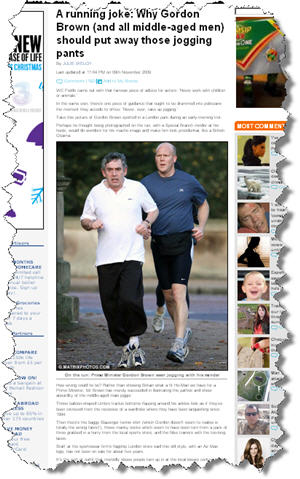Nothing wrong with a spot of mild iconoclasm. From time to time, we need to take our prejudices off the shelf, blow the dust off them, and give them a good examination. Are they still fit for purpose? Or are they just being kept for sentimental reasons? Recently, I’ve been ambushed by two long-standing prejudices. One delivered an unexpected kiss; the other, a painful bruise.
 I’ve long been an admirer and advocate of Julie Welch. Her book on a bunch of random characters preparing for the London Marathon, “26.2”, was one of the first running books I read. In my wide-eyed naivety, its pages provided a deceptively cosy entrance to the possibility of an unfit, middle-aged person running long distances and surviving. More than surviving: being somehow enriched and strengthened by the experience. It was an inspirational gateway to this secret garden, and I’ve always felt indebted to her.
I’ve long been an admirer and advocate of Julie Welch. Her book on a bunch of random characters preparing for the London Marathon, “26.2”, was one of the first running books I read. In my wide-eyed naivety, its pages provided a deceptively cosy entrance to the possibility of an unfit, middle-aged person running long distances and surviving. More than surviving: being somehow enriched and strengthened by the experience. It was an inspirational gateway to this secret garden, and I’ve always felt indebted to her.
But I came across this recently: www.justinhorton.blogspot.com/2007/01/aide-memoire.html, and felt suitably disappointed. Anyone who spends a lot of his time writing is bound to incorporate strands of other people’s thinking. I know that the more wistful parts of the Welch mindset and temperament have percolated through to help form my own. Humans are humans because they are absorbent and receptive, and able to process the ideas of others, and learn from them. But for a writer, unequivocal plagiarism is taking admiration too far.
Any chance that I might have forgiven her this transgression was eliminated a few days later. I was stoically pedalling the static bike in the gym, squeezing out the last few drops of energy after a tough interval session on the treadmill. As usual, the gratis copy of the Daily Mail was draped across the handlebars, and I was gratefully topping up with vital social data about Katie Price and Cheryl Cole. As I blankly leafed through the sweat-splashed pages, I came across an item by none other than Julie Welch. About running. What a lovely combination.
But wait. The worm had turned.
I read the article with an increasing sense of panic and despair. Here was my running inspiration spitting bad blood over her own reputation. She was talking about Gordon Brown, who has evidently committed the cardinal sin of trying to get fitter. She describes a snap of him running around the Whitehall block at 7 a.m. as “illustrating the pathos and sheer absurdity of the middle-aged male jogger”
Apparently this activity has “now become a modern plague”.
There is then a bizarre twist, as if the sub-editor has insisted on a spot of balance. She suddenly adds: “Such exercise is a great de-stresser. It gives valuable me time, away from the demands of work and family. It is fantastically good for weight control and, should you reach a stage of fitness where you can manage it, a 20-mile run is no less than instant liposuction.”
Eh?
But don’t worry. She soon abandons that brief lapse into coherence, and continues: “The sad truth for middle-aged men is that whatever the motivation for participating in amateur sport, it never makes you look like a real sportsman. Head lolling, beetroot-faced, gasping for breath – jogging simply makes people look stupid.”
So. Farewell Julie Welch. We came a long way together — or so I thought. At some point we must have reached a fork in the path without me realising. Now I look around, and she is gone. Was she ever really there?
It’s not her opinion that grates. That’s all it is — an opinion, albeit a vacuous Mailish one. OK, so it’s not decent for middle-aged blokes doing exercise to be seen in daylight. Yawn. Her sin is not the embarrassing, tittery silliness of the view, even if her indignation seems frighteningly genuine. Her sin is no longer being one of us. It’s the realisation that she’s nothing more than a jobbing journo after all. The marathon stuff, the documenting of the lives of ordinary middle-aged people as they strove to reach beyond the deepening hole they found themselves in — it was just an expedient writing project. The Daily Mail hatchet job — again, an expedient writing project. Lazy, easy journalism. Just like her apparent decision to copy chunks of someone else’s football report when she’s asked to contribute a piece to the Observer.
 Ever since I was at school, thirty years or more ago, I’ve thought of Status Quo as a horribly uncool band. They seemed to spend decades pumping out formulaic hits with an over-reliance on 12-bar blues, droney vocals, and lukewarm misogyny. I never hated them, but they were filed away as a sort of West Bromwich Albion of the pop world. Not quite good enough anymore to belong in the top flight, but too buoyant and determined and well-supported to keep down in the lower level.
Ever since I was at school, thirty years or more ago, I’ve thought of Status Quo as a horribly uncool band. They seemed to spend decades pumping out formulaic hits with an over-reliance on 12-bar blues, droney vocals, and lukewarm misogyny. I never hated them, but they were filed away as a sort of West Bromwich Albion of the pop world. Not quite good enough anymore to belong in the top flight, but too buoyant and determined and well-supported to keep down in the lower level.
A few months ago, I saw they were coming to the Anvil in Basingstoke, and thought, what the hell. This could be the final pre-zimmer tour. I bought some tickets, then we forgot all about it. Until last week, when my Outlook calendar reminded me that Saturday was Quoday. We both groaned, and even considered not bothering. But Saturday night came, and we made our usual last-minute dash down the A33 to Basingstoke, 20-odd miles away.
Status Quo were sensational. Uncool? Maybe so, but they can still knock out some of the tightest, loudest, dancingest rock and roll known to man. Francis Rossi and Rick Parfitt are still bouncing around like the teenagers they’ve not been since the sixties. It’s hard to believe they played their first gig before JFK met his end. Rossi looks like a High Court judge with his wig off, while more reassuringly, Parfitt has opted to retain the Boris Johnson-like golden mane, and the worn-out rock star demeanour.
And so, as one statue topples, another must rise to take its place. Out goes Welch, in comes Quo. It’s a fair swap.
